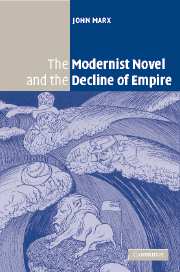3 - Gender, aesthetics, and colonial expertise
Published online by Cambridge University Press: 22 September 2009
Summary
We rather feel, than survey …
William GilpinBefore modernist writers could convince readers that their literary efforts featured techniques for reorganizing the world, they had to create a clear sense of the disorder that required such management. They had to portray for their readership the ‘immense panorama of futility and anarchy which is contemporary history’, as T. S. Eliot described it (Selected Prose 177). To this end, they produced what is often called a crisis of colonial understanding. By depicting the dark underside of colonization, and by explaining what happens to European consciousness in the colonies, certain authors made their expertise seem necessary to literate Europeans. For example, I have argued that Joseph Conrad linked Europe's troubles to the sentimentalization of colonial adventure. Narratives such as ‘Heart of Darkness’ demonstrated both the peril and the possibility inherent in ‘intimacy [that] grows quickly out there’ by depicting new arrangements between Europeans and their colonial subjects (158).
Conrad's fiction is famously ambivalent about the sentimentality it encourages. Sympathy helps Marlow to become Kurtz's confidant and to describe a complex attachment to his dead helmsman, but belief in sentimental decorum also keeps him from dispelling the Intended's faith in her fiancé's ‘generous mind’ and ‘noble heart’ (160). Ambivalence about sentimentality is not restricted to modernist men. One can observe it in To the Lighthouse, where the sentimental object par excellence is supposedly displaced by a ‘triangular purple shape’, the figure that marks the place of the absent Mrs Ramsay in Lily Briscoe's painting.
- Type
- Chapter
- Information
- The Modernist Novel and the Decline of Empire , pp. 92 - 121Publisher: Cambridge University PressPrint publication year: 2005



